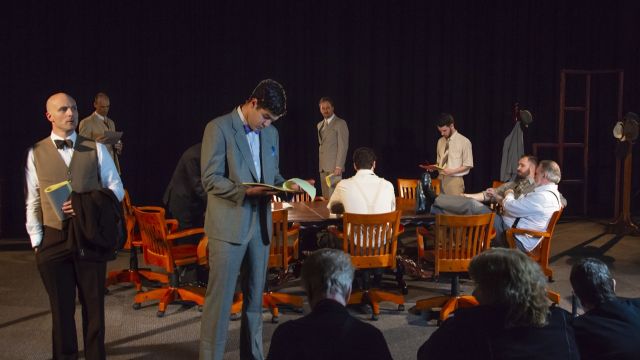12 Angry Men
Take a room full of testosterone. Pressurise it with heat, sweat, humidity, life and death decisions, a fan that doesn’t work and just the one face towel that pretty much all the men use to mop their brows. Throw in racism and rationality, and you have the makings of a tense 90 minutes. 12 Angry Men is the prototypical jury drama, written in 1954 by Reginald Rose and reworked dozens of times thereafter.
The play is a fascinating study of influence and aggression. The action takes place in a jury room during their deliberations on the trial of a young man accused of the murder of his father. If he is found guilty, the mandatory sentence is death. The nature of the forensic evidence—a knife, floor plans and eye witness testimony—coupled with the fact that all the jurors are male, means that without a substantial rewrite there is no way that the play can be set at any time later than the 1960s. The script explores the nature of what is knowable, how memory works and the limitations of witness testimony. There were twelve male personalities in the room, many vying to dominate the argument and becoming angry and threatened when their viewpoint was contradicted. At the outset, all but one of the jury is convinced of the boy’s guilt. Only juror 8, an architect (Isaac Reilly), is discomforted enough by the prosecution case to start raising doubts.
 Director Jarrad West has chosen a minimalist, naturalistic setting, with no bells or whistles to distract. With 90 minutes of twelve people in one room around one table with occasional excursions into one bathroom to mop a brow, West has fine-tuned the pace and chosen top-notch actors to drive the story forward. The audience will be riveted by the process of logic, but also by the ebb and flow of dominance of the discussion, and how each man brings their life experience, personal grudges, prejudices, disinterest and personalities to the table. Each of these actors nails the personality of their juror, some with only a few lines of dialogue: Tony Turner, Will Huang, Glenn Brighenti, Alex Hoskison, Pat Gallagher, Geoffrey Borny, Cole Hilder and Duncan Driver are all excellent and provide important depth. Colin Giles makes Juror #10 a obnoxious and frighteningly aggressive bigot, while Martin Searles plays the stockbroker Juror #10 with calm rationality. Main hero juror #8 Isaac Reilly conveys an assertive persuasiveness while Rob de Fries as Juror #3, a man struggling with his estrangement with his son, provided flashes of violent anger as well as deeply poignant moments.
Director Jarrad West has chosen a minimalist, naturalistic setting, with no bells or whistles to distract. With 90 minutes of twelve people in one room around one table with occasional excursions into one bathroom to mop a brow, West has fine-tuned the pace and chosen top-notch actors to drive the story forward. The audience will be riveted by the process of logic, but also by the ebb and flow of dominance of the discussion, and how each man brings their life experience, personal grudges, prejudices, disinterest and personalities to the table. Each of these actors nails the personality of their juror, some with only a few lines of dialogue: Tony Turner, Will Huang, Glenn Brighenti, Alex Hoskison, Pat Gallagher, Geoffrey Borny, Cole Hilder and Duncan Driver are all excellent and provide important depth. Colin Giles makes Juror #10 a obnoxious and frighteningly aggressive bigot, while Martin Searles plays the stockbroker Juror #10 with calm rationality. Main hero juror #8 Isaac Reilly conveys an assertive persuasiveness while Rob de Fries as Juror #3, a man struggling with his estrangement with his son, provided flashes of violent anger as well as deeply poignant moments.
The staging was in the middle of a hall, with the audience sat around the stage in rows, with the juror’s table in the middle on the same level. This was a major issue—if you are short, you will want to get there early so that you can take a front row seat to see the action. It would perhaps have helped to either find some way to stagger the chairs or even build a raised floor so that people could better see what was going on.
This is a tight, competent rendition of a classic. Highly recommended.
Cathy Bannister
Subscribe to our E-Newsletter, buy our latest print edition or find a Performing Arts book at Book Nook.

